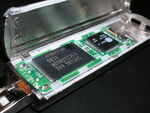
A USB flash drive. The chip on the left is the flash memory.
Definitions[]
Flash memory (also called a flash card) is
| “ | [h]igh-density non-volatile computer memory designed for rugged applications. The advantages of flash memory are non-volatility and a simple and inexpensive cell structure. The major disadvantages are that individual bytes cannot be erased and overwritten, but instead, sections of the device or the entire device are erased. Also, erase/write cycles are much slower than read operations and may require complex erase and write algorithms to insure the device is not damaged during these operations.[1] | ” |
| “ | is a type of constantly-powered, non-volatile memory that can be erased and reprogrammed in units of memory called blocks.[2] | ” |
Overview[]
"Flash memory gets its name because the chip is organized so that a section of memory cells are erased in a single action or 'flash.'"[3]